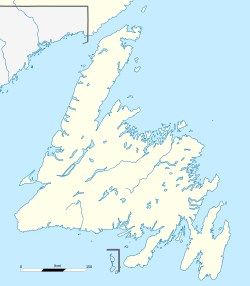|
Portugal Cove–St. Philip's
Portugal Cove–St. Philip's is a rural seashore community located on the eastern Avalon Peninsula of Newfoundland in the province of Newfoundland and Labrador, Canada. The town is a bedroom community of the provincial capital of St. John's. The provincial government operates a daily ferry service from Portugal Cove–St. Philip's to Bell Island.[2][3] GeographyLocated less than 15 minutes' drive from the provincial capital of St. John's, and covering 56.43 km2 (21.79 sq mi), it borders the City of St. John's to the east, and the Town of Paradise to the west. Located on Conception Bay, it is the site of a ferry terminal which provides daily access to and from Bell Island, and dozens of people commute from this tiny island to work in and around the capital city, daily.[4] The town motto is Where the Sun Meets the Sea. DemographicsIn the 2021 Census of Population conducted by Statistics Canada, Portugal Cove–St. Philip's had a population of 8,415 living in 3,170 of its 3,357 total private dwellings, a change of 3.3% from its 2016 population of 8,147. With a land area of 57.61 km2 (22.24 sq mi), it had a population density of 146.1/km2 (378.3/sq mi) in 2021.[5] In 2011, the town’s population has a median age of 39.5 years, which is slightly lower than the provincial median of 40.6 years.[6] History The community is one of the oldest in Newfoundland and has a rich history. It was founded by the Portuguese and was one of the first non Native villages established in the New World by Europeans. The Portugal Cove area has historically been predominantly Roman Catholic. The Roman Catholic population was served by Holy Rosary Church until it closed in 2022. It was attacked and burned by the French in 1696, was the site of the first road built outside the capital St. John's, it was also here that the giant squid or kraken of legend was discovered and documented. The community has a large body of folklore and oral traditions. Settled by fishermen from the West Country of England and Ireland it also has a small settler tradition from Jersey in the Channel Islands. It is named after Portugal. Fishing had been a mainstay since the 17th century and this has been on the downswing since the 1990s. Notable people
References
External linksWikimedia Commons has media related to Portugal Cove – St. Philip's. |
||||||||||||||||||||||||||||||||||||||||||||


